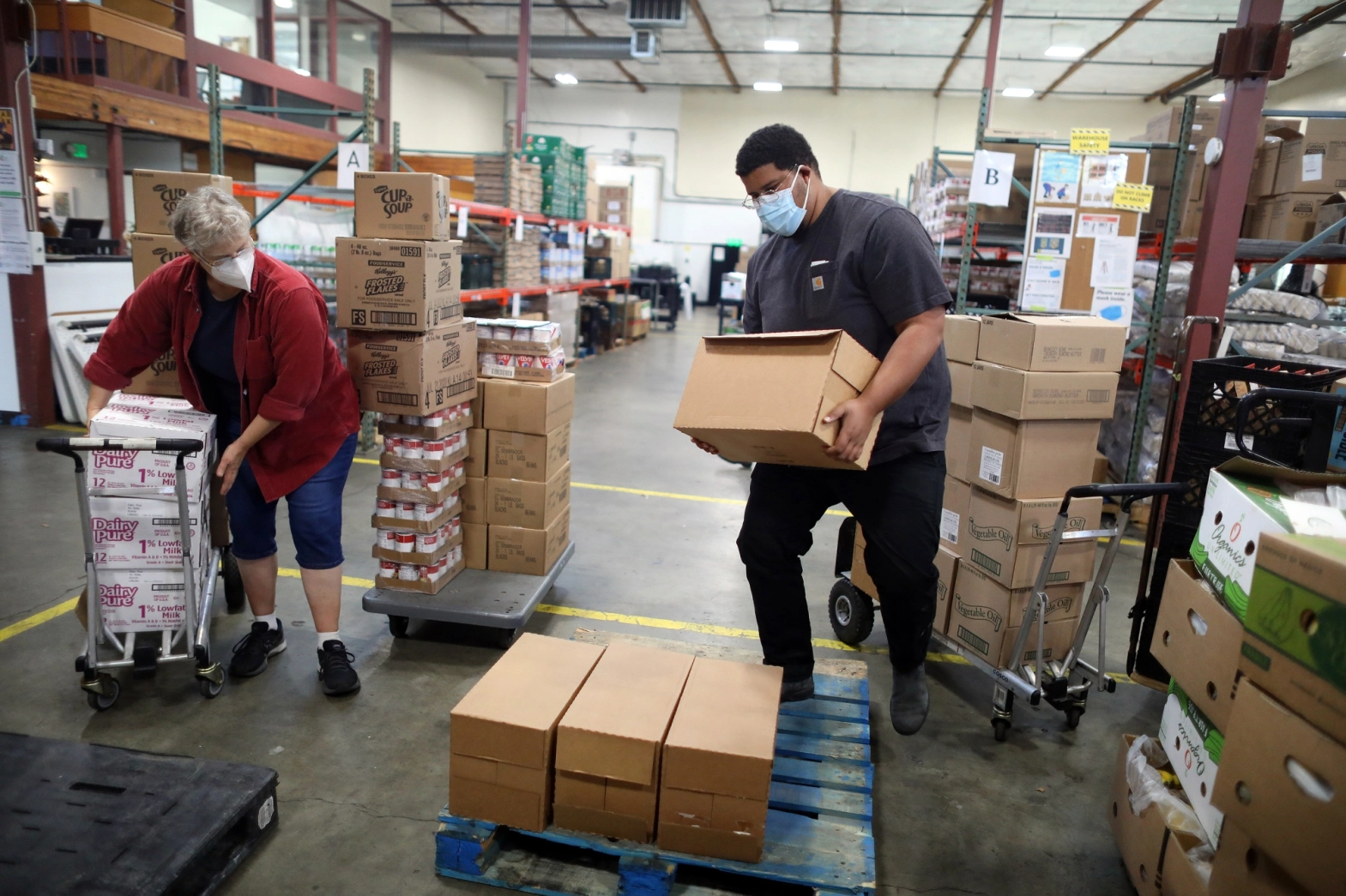Carolyn Sharp is grateful that Berkeley Food Network has embarked on a dynamic quest during the COVID pandemic: end hunger in the iconic East Bay city.
“The Berkeley Food Network is a main artery for this neighborhood,” said Sharp, who lives around the corner from the pantry near the corner of Ninth Street and University Avenue. “It’s a lifeline. People come here not just from Berkeley, but from Richmond and Oakland.”
In February 2020, before extensive business shutdowns to combat the coronavirus, Berkeley Food Network was serving about 1,500 clients a week in its various programs. By May 2020, that number had climbed to about 5,000 people a week, said Sara Webber, the nonprofit’s executive director and co-founder. It also expanded its on-site pantry in the company’s home base on Ninth Street.
“When COVID hit, most of the people who were adversely affected by the job cuts and layoffs came to our pantry,” Webber said. “That has become one of our biggest programs. We probably serve 70 families a day now at the pantry. We used to serve 30 a day.”
Berkeley city officials approached the food pantry asking for assistance in serving meals to people who had been jolted greatly by coronavirus-linked economic woes, including delivering bags of food to the unhoused population and adding programs for seniors.
“We were able to serve many more seniors. We were able to provide them with many meals, including pre-made breakfasts that were individually packaged and frozen,” Webber said.
Webber became interested in food assistance after taking a job in 2014 at the Berkeley Food Pantry, a separate organization that serves Berkeley and Albany, because she wanted more time to be able to watch her son’s high school baseball games. She decided she wanted to do more and teamed up with three other people to eventually found the Berkeley Food Network in 2016 and by 2018 had started to distribute food. In the fall of 2019, the food network leased its current location on Ninth Street for $1 a month from the city of Berkeley.
The organization now serves as a network for other food assistance providers, runs a distribution warehouse, on-site pantry and mobile pantry, and recovers about 60,000 pounds of surplus food from local businesses that is converted into packaged and frozen meals, instead of going to waste.
Berkeley Food Network received funding this year from Share the Spirit, an annual holiday campaign that serves residents in need in the East Bay. Donations will help support 56 nonprofit agencies in Contra Costa and Alameda counties. The organization will use its grant to purchase seasonal produce, chickens, eggs and other foods for distribution through its mobile pantries and on site pantry and warehouse.
Webber said the nonprofit was able to expand its reach during the pandemic by forging and fortifying connections with organizations throughout Berkeley and nearby regions.
While Berkeley Food Network has typically used mobile pantries to serve clients, when the virus erupted, it shifted to add deliveries of bags of food. It is also working with local food food producers to increase access to healthy foods.
“We are trying to source a lot of produce locally,” Webber said. “We are working with some small farmers in the area and are purchasing food from them. By doing this we are participating in the local economy.”
Jake Kosek, a small farmer with RSV Farms in Pescadero on the San Mateo County coast, is enthusiastic about his family farm’s partnership with Berkeley Food Network, which started after the pandemic hit.
“We love working with them,” Kosek said. “They are not only a food bank, they also bring food to people. they are trying to locally source and they are tailoring their food to what their clients need.
“So we now produce the same high-quality food for them that we produce for restaurants. People can get whatever is in season, fresh local produce. We can feed people good food, not the leftover, not stuff that is rotting,” Kosek said.
Tawfiq Paul, a Berkeley resident who lives near the main pantry, said he heads over about once a week to pick up food.
“It’s like going to a grocery store,” Paul said. “They have great variety there. This saves me a lot of money.”
Over the one-year period that ended in October, food prices have soared 5.6% in the Bay Area, federal officials report. Meat, poultry, fish and egg prices have zoomed 13.6% higher.
“The price of everything is skyrocketing,” Sharp said as she prepared to carry food inside her apartment building.
Hiring appears to be on a modest upswing in the Bay Area and California, but that doesn’t mean the need for food assistance has vanished.
“People who went back to work may still be struggling to get back on their feet, or they have jobs that were not as good as the ones they had, or their benefits may be reduced,” Webber said.
“It is really important for people to select their own food,” she added. “We are trying really hard to make sure that everyone is treated with dignity when they are using one of our programs.”
